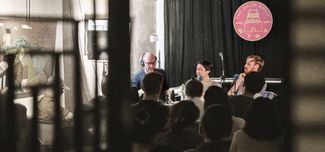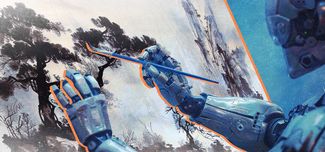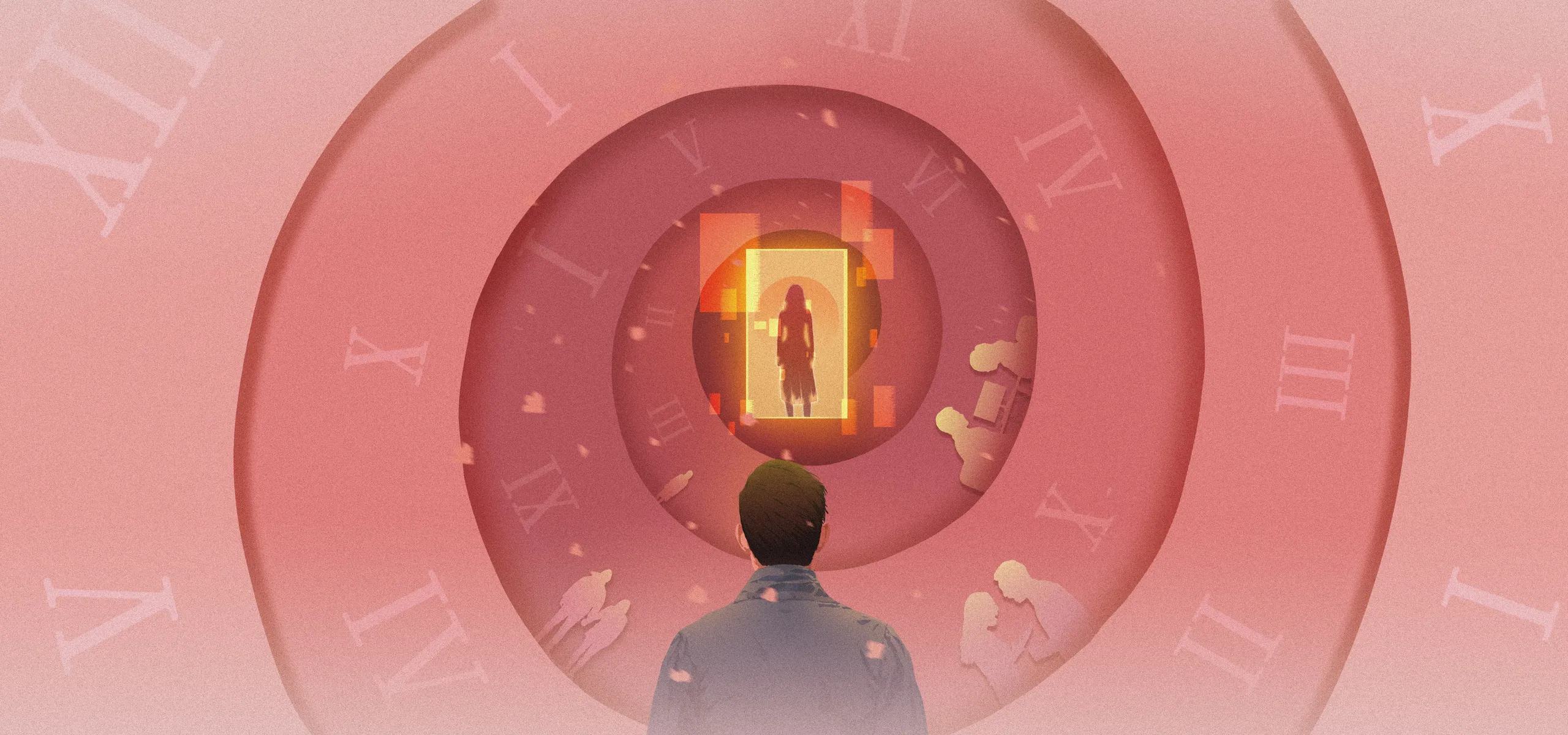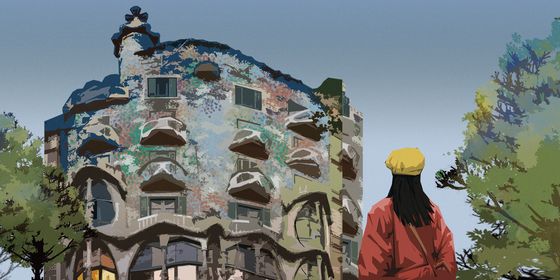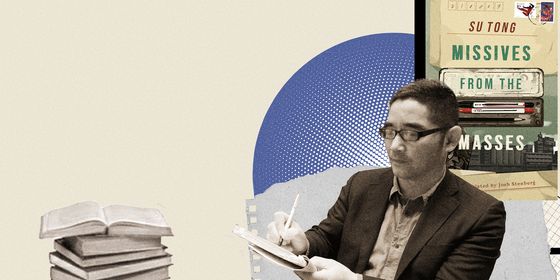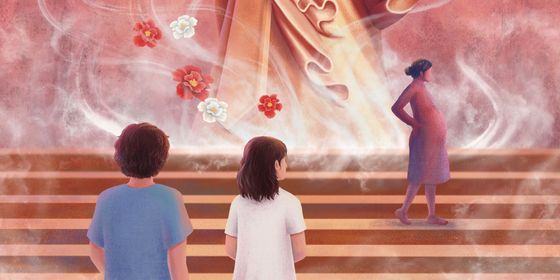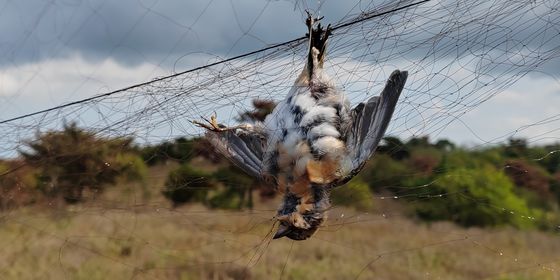A time-bending tale of love and life from author Li Hongwei
Almost time.
He looks around the room one more time. Three silent bunks. The beds clean, the desks below tidy.
His bed—all in order… Not a single crease in the sheets. The blanket folded into a perfect block.
On his desk, only a computer. Books on the shelf or in drawers. The only items left out are his old white mug, and another, new one. It has a light blue glaze. Two holographic zebras nuzzling each other and whispering. He reaches out his right hand and turns the mug, so that the zebras seem to move. One of their tails swishes. He sees the trace of his last cup of tea inside his white mug. Why wasn’t it cleaned? He takes the cup and goes to the washroom. A knock at the door. He rushes back to the desk and sets the cup down. He pauses, squints, moves it to the other side of the computer, and then takes a longer look. He pushes it in a bit further. Knocking again. Two steps, then back. Feet on the ladder up to the bunk. Pull down the blanket. Finally, two bounds toward the door. He rips the door open on the second knock of the third round.
Five years, eight months, three days later, he pulls the door open on the fourth knock of the first round. Outside the door, there is a solemn, gorgeous radiance. Fourteen years later, he opens the door in the same instant she takes out the key. Unexpectedly, a soft pink haze rushes in. Fourteen years, one month, and twenty-seven days later, she hammers on the door, and he sits at his desk, staring at her on the screen, crouched between two girls. Thirty years later, at around the same time, two minutes to four, he stands in front of the bedroom door, straightens his collar, strokes his cheek, reaches out and knocks. From inside she answers, “What’s wrong?”
“It’s May 15,” he says.
On May 15, at the present moment, he hurriedly wipes his hands dry on his pants, composes himself, and pulls open the door, as if he had never opened a door before. She stands there, in the same clothes she wore when they met in the cafeteria, the same shirt and the same pants. She has put on white sneakers with three dark purple stripes. Later, when he takes her shopping, sees similar shoes in a store, and asks about her pair, she says she has no idea where she lost them. Nine years, nine months, nine days later, she sorts through her closet and finds the shirt and the pants. She holds them up against herself, sighs, and says, “I can’t wear these.” Before he can say anything, she tosses them into a garbage bag.
“What are you doing?” she asks. “It’s taking forever.”
“Nothing,” he says, stepping aside. “Come in.” He pauses. “They aren’t here.” He says nothing more. She hesitates. Fourteen years, one month, twenty-six days later, when she says those words to him, he sees the same hesitation. But the hesitation is more fleeting than it had been at that moment in the present. It gives way to a firmer determination.
“Where did they go off to?” she asks, walking inside, not paying attention to the closed bathroom door or the three other bunks, going right to his desk as if she knew it was his. When she gets to the desk, she stands there as if sizing it up, or as if she is dazed for a moment and surprised to find herself there.
He begins to panic. “Homework, shooting hoops... They went out...” He takes two steps toward her. She turns back. Her expression is inquisitive and probing. He quickly adds: “Sit, sit, please.” He gestures at his own chair. He pulls up the chair from the other bunk. It creaks as he scrapes it across the floor. She frowns. Eight months and one day later, six hours later than the present moment, in the same room, she says, “Aiya!” He turns around in his chair and sees her holding up her right index finger, which has a bead of red blood hanging from it. Leaning toward her across crossed legs, his chair gives a harsh, multilayered creak. She forgets or doesn’t have time to frown at the sound. He takes her hand and inspects her finger. He sits down. He sits back in the chair. She sits back, too. He gets to his feet soon after, and asks, “What do you want to drink?”
She looks at him, tilts her head, and asks, “You got any beer?” A year, ten months, five days later, she waves off the bottle of soda he offers her, tilts her head, and asks, “You got any beer? We should be celebrating.” That day, she drinks three bottles, accepting a toast from all his friends, sometimes by herself, sometimes with him. When they leave the hot pot restaurant, she throws her arms around him for a hug. When he lowers his head, she says, “It’s good, to still be a student.” Without waiting for him to answer, she asks, “Why do you love me?” Four years, one month, one day later, she waves off the cup of tea that he offers her, doesn’t tilt her head, smiles, and says, “You got any beer? Let’s celebrate.”
She watches as he cracks a bottle of Wusu and fills a mug, watching the foam overflow and slip down the glass onto the table. She pauses, waiting for the foam to settle, picks up the glass, and clinks it hard against his. “This is great!” she says. “You’re staying, too.” She takes a sip and clinks her glass against his again. “The place I always want to go.” She finishes the glass. A moment later, she smiles, and says, “I’m not saying I don’t like my job!” She watches him pour two more glasses and asks, “Do you know why I told you not to invite anybody else?” She glances around. She leans forward. He moves, too. But she sits back and shoots him a smile he will remember for the rest of his life.
Thirty-six years, seventeen days later, she faces a room full of friends, and her eldest daughter, in a white wedding dress, and whispers to him, “Pass me that glass of beer.” He waves his hand, motioning his younger daughter not to move. He opens a bottle of beer and carefully pours it into a glass, taking care not to let the foam overflow. He lifts the glass and takes a sip before passing it to her.
At the present moment: he shakes his head, caught unprepared. “I don’t have any,” he says. “I’ll go get some. Is Yanjing okay? Maybe Tsingtao?” She smiles and he realizes that he looks foolish. He scratches his head and asks, “You want a soda? I’ve got tea, too. I think it was Dragon Well.”
“Tea is good,” she says. “I’ll try your Dragon Well.” She takes the mug and twists it around. She stares at the two sets of zebra eyes. “Put my tea in here,” she says. “Pretty neat cup. The zebras are so ugly they’re cute.” She looks into the cup. “It’s clean.”
Create a free account to keep reading up to 10 free articles each month
Fantastic Five | Short Story is a story from our issue, “After the Factory.” To read the entire issue, become a subscriber and receive the full magazine.



